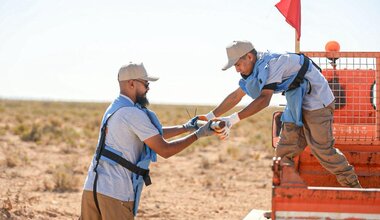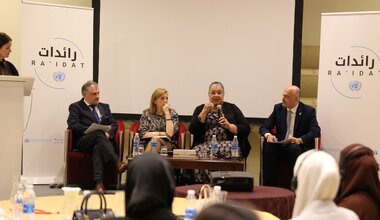Statement by the Co-Chairs (Netherlands, Switzerland and UNSMIL) of the International Humanitarian Law and Human Rights Working Group of the International Follow-up Committee on Libya
‘Unity, Principled Leadership, Respect for Human Rights Vital after
Catastrophe in East Highlights Severe Governance Deficit’
Tripoli, 28 September 2023
The co-chairs of the International Humanitarian Law and Human Rights Working Group of the International Follow-up Committee on Libya established under the Berlin process – the Netherlands, Switzerland, and the United Nations Support Mission in Libya – convey their sincere condolences to the Libyan people, especially those affected by the floods in eastern Libya.
On 11 September 2023 storm Daniel unleashed unimaginable destruction and suffering in Derna and surrounding areas. The two dams that collapsed due to the flooding, wiped out entire neighbourhoods, killing at least 4,255 people with over 8,540 individuals still missing and some 43,000 persons displaced.
Against the backdrop of immeasurable loss and suffering, it is heartening to see people and communities across the country joining forces in solidarity and compassion, helping each other through this crisis. A large humanitarian response is also underway as survivors need food, water, medical services, shelter, and urgent psychosocial care.
The severe governance deficit in Libya has failed Libyans. Now, more than ever, Libyans demand unity of purpose and a moral leadership that puts the human rights and dignity of the people first. A tragedy of this magnitude must be the catalyst for ending the political stalemate. Calls for change across the country are louder and growing. The status quo of political and institutional divide, and the lack of accountability for national resources and funds, cannot go on.
The co-chairs further emphasise that national and international humanitarian actors should be enabled to work in a timely and independent manner. A civilian led humanitarian response is vital to protect and assist affected people in devastated areas in a rights-based, transparent, and effective way.
The magnitude of the catastrophe, the widespread allegations of corruption and negligence, the governance deficit, and the lack of accountability require an independent and transparent investigation. For a rights-based recovery and reconstruction, transparency and good governance are critical.
The co-chairs echo calls for the establishment of an independent mechanism to oversee reconstruction in the east. Representatives of people impacted should be meaningfully included to ensure their needs and rights are fully addressed.
 United Nations Peacekeeping
United Nations Peacekeeping UN
UN









